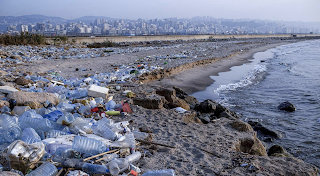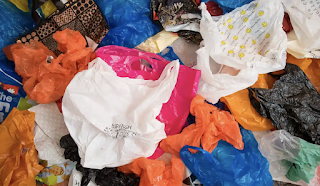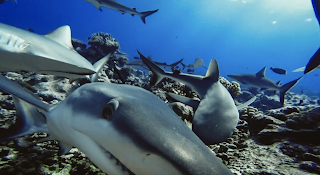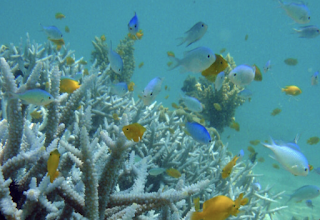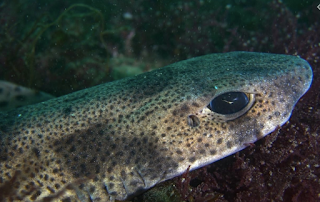Over 260 Chinese fishing ships surround the Galapagos Islands, Plastic flow into ocean projected to triple by 2040, Plastic bag use drops 59% in England, Life-threatening mercury levels found in Hong Kong shark fins and more…
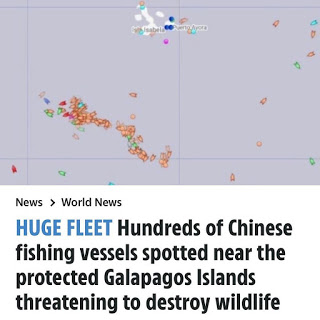 Ecuador has sounded the alarm after its navy discovered a huge fishing fleet of Chinese-flagged vessels some 200 miles from the Galápagos Islands, the archipelago which inspired Charles Darwin’s theory of evolution. About 260 ships are currently in international waters just outside a 188-mile wide exclusive economic zone around the island, but their presence has already raised the prospect of serious damage to the delicate marine ecosystem, said a former environment minister, Yolanda Kakabadse. “This fleet’s size and aggressiveness against marine species is a big threat to the balance of species in the Galápagos,” she told the Guardian.
Ecuador has sounded the alarm after its navy discovered a huge fishing fleet of Chinese-flagged vessels some 200 miles from the Galápagos Islands, the archipelago which inspired Charles Darwin’s theory of evolution. About 260 ships are currently in international waters just outside a 188-mile wide exclusive economic zone around the island, but their presence has already raised the prospect of serious damage to the delicate marine ecosystem, said a former environment minister, Yolanda Kakabadse. “This fleet’s size and aggressiveness against marine species is a big threat to the balance of species in the Galápagos,” she told the Guardian.
2. Plastic flow into ocean expected to triple by 2040, action could stem tide more than 80%
A new analysis finds that without immediate and sustained action, the annual flow of plastic into the ocean could nearly triple by 2040. The study also identifies solutions that could cut this volume by more than 80% using technologies available today, if key decision-makers make system-wide changes. The research found that if no action is taken to address the projected growth in plastic production and consumption, the amount of plastic entering the ocean each year would grow from 11 million metric tons to 29 million metric tons over the next 20 years, equivalent to nearly 50 kilograms (110 pounds) of plastic on each meter of coastline worldwide.
Read more in “Pew Charitable Trusts”
Shoppers’ use of plastic carrier bags in England has continued to fall – by 59% in the last year alone – since the introduction of the 5p charge, according to recent figures. Overall, sales of single-use plastic carrier bags have dropped by more than 95% in England’s main supermarkets since the charge was introduced in October 2015, government data reveals. In the past 12 months, Asda, Marks and Spencer, Morrisons, Sainsbury’s, the Co-operative Group, Tesco and Waitrose sold 226m bags – 322m fewer than in 2018-19.
Juvenile fishes have one of the highest mortality rates compared to other life stages. Within two days of settling into a reef almost 60 percent are consumed by predators. Our recent study found noisy boats and ships can also affect the prey response of these young fishes. When exposed to the noise of vessels, juvenile fishes decreased their activity, which reduced their swimming distance. Previous research found more active fishes learn faster about their environment and potential predators, which results in a higher chance of survival.
Microplastics have been found in the guts of sharks that live near the seabed off the UK coast. University of Exeter scientists studied four species of demersal (seabed-dwelling) shark. Of the 46 sharks examined, 67% contained microplastics and other human-made fibers. A total of 379 particles were found and — though the impact on the sharks’ health is unknown — the researchers say it highlights the “pervasive nature of plastic pollution.”
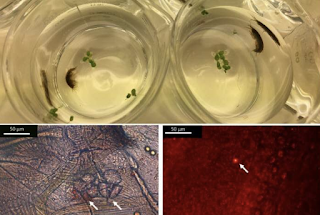 Researchers from University College Cork have discovered that microplastics (plastic pieces smaller than 5 mm) in our freshwaters are being broken down into even smaller nanoplastics (smaller than 1 µm, at least five thousand times smaller in size) by a type of freshwater invertebrate animal, and that this may happen much faster than previously estimated. Their findings have significant consequences for the understanding of microplastics in our environment and could have implications for the food chain.
Researchers from University College Cork have discovered that microplastics (plastic pieces smaller than 5 mm) in our freshwaters are being broken down into even smaller nanoplastics (smaller than 1 µm, at least five thousand times smaller in size) by a type of freshwater invertebrate animal, and that this may happen much faster than previously estimated. Their findings have significant consequences for the understanding of microplastics in our environment and could have implications for the food chain.9. Deep-sea microbes dormant for 100 million years revive hungry and ready to multiply
 For decades, scientists have gathered ancient sediment samples from below the seafloor to better understand past climates, plate tectonics and the deep marine ecosystem. In a new study published in Nature Communications, researchers reveal that given the right food in the right laboratory conditions, microbes collected from sediment as old as 100 million years can revive and multiply, even after laying dormant since large dinosaurs prowled the planet.
For decades, scientists have gathered ancient sediment samples from below the seafloor to better understand past climates, plate tectonics and the deep marine ecosystem. In a new study published in Nature Communications, researchers reveal that given the right food in the right laboratory conditions, microbes collected from sediment as old as 100 million years can revive and multiply, even after laying dormant since large dinosaurs prowled the planet.
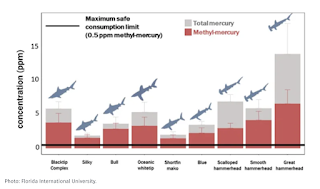 A new study has found dangerous amounts of mercury in shark fin sold for human consumption in Hong Kong. Led by the Florida International University Institute for Environment, researchers from the US and Hong Kong tested fin samples from nine shark species commonly sold in Asian markets. The mercury levels found in the samples greatly surpassed the legal restrictions and health guidelines issued by the Hong Kong Centre for Food Safety. The study tested for both the total amount of mercury and the amount of methyl-mercury – its most toxic form.
A new study has found dangerous amounts of mercury in shark fin sold for human consumption in Hong Kong. Led by the Florida International University Institute for Environment, researchers from the US and Hong Kong tested fin samples from nine shark species commonly sold in Asian markets. The mercury levels found in the samples greatly surpassed the legal restrictions and health guidelines issued by the Hong Kong Centre for Food Safety. The study tested for both the total amount of mercury and the amount of methyl-mercury – its most toxic form.
Read more in “Hong Kong Free Press”
 Single bananas. Hard-boiled eggs. Chocolate chip cookies. In convenience stores across Japan these items all have something in common: they are routinely sold tightly swaddled in plastic wrapping. It’s been that way for decades. Of the 540 billion plastic shopping bags used annually worldwide, consumers in Japan get through about 30 billion of them. To put that in context, Japan has twice the population of the UK, but uses 17 times as many plastic bags. The US knocks them both out of the park, using an estimated 100 billion bags each year.
Single bananas. Hard-boiled eggs. Chocolate chip cookies. In convenience stores across Japan these items all have something in common: they are routinely sold tightly swaddled in plastic wrapping. It’s been that way for decades. Of the 540 billion plastic shopping bags used annually worldwide, consumers in Japan get through about 30 billion of them. To put that in context, Japan has twice the population of the UK, but uses 17 times as many plastic bags. The US knocks them both out of the park, using an estimated 100 billion bags each year.
Read more in “CNN”
12. Shark finning: why the ocean’s most barbaric practice continues to boom
 In the narrow streets of Sai Ying Pun neighborhood, the center of Hong Kong’s dried seafood trade, most window displays give pride of place to a particular item: shark fins. Perched on shelves, stuffed in jars and stacked in bags, shark fins are offered in all shapes and sizes. Several shops even include “shark fin” in their name. Fins are lucrative, fetching as much as HK$6,800 (£715) per catty (604.8g, or about 21oz), and the trade is big business. Hong Kong is the largest shark fin importer in the world, and responsible for about half of the global trade. The fins sold in Sai Ying Pun come from more than 100 countries and 76 different species of sharks and rays, a third of which are endangered.
In the narrow streets of Sai Ying Pun neighborhood, the center of Hong Kong’s dried seafood trade, most window displays give pride of place to a particular item: shark fins. Perched on shelves, stuffed in jars and stacked in bags, shark fins are offered in all shapes and sizes. Several shops even include “shark fin” in their name. Fins are lucrative, fetching as much as HK$6,800 (£715) per catty (604.8g, or about 21oz), and the trade is big business. Hong Kong is the largest shark fin importer in the world, and responsible for about half of the global trade. The fins sold in Sai Ying Pun come from more than 100 countries and 76 different species of sharks and rays, a third of which are endangered.Read more in “Australian Research Council”
 Dog fur is particularly good at cleaning up crude oil, according to a new study investigating sustainable options to clean up oil spill disasters. Together with human hair recycled from salons, recycled dog fur can be used as an effective and sustainable way to mop up dangerous environmental contaminants on land. Oil spill disasters on land cause long-term damage for communities and the natural environment, polluting soils and sediments and contaminating groundwater.
Dog fur is particularly good at cleaning up crude oil, according to a new study investigating sustainable options to clean up oil spill disasters. Together with human hair recycled from salons, recycled dog fur can be used as an effective and sustainable way to mop up dangerous environmental contaminants on land. Oil spill disasters on land cause long-term damage for communities and the natural environment, polluting soils and sediments and contaminating groundwater.
 Germany is stepping up measures to get in line with European Union guidelines to ban single-use plastics by 2021. In an effort to squash “throw-away culture,” Germany is banning the sale of single-use plastic straws, cotton buds, and food containers. As of July 3, 2021, consumers will no longer find these items in circulation. Some of the items on the chopping block are single-use cutlery, plates, stirring sticks, and balloon holders, as well as polystyrene cups and boxes. Germany’s course of action puts it on track to meet the European Union standards that were finalized in March 2019.
Germany is stepping up measures to get in line with European Union guidelines to ban single-use plastics by 2021. In an effort to squash “throw-away culture,” Germany is banning the sale of single-use plastic straws, cotton buds, and food containers. As of July 3, 2021, consumers will no longer find these items in circulation. Some of the items on the chopping block are single-use cutlery, plates, stirring sticks, and balloon holders, as well as polystyrene cups and boxes. Germany’s course of action puts it on track to meet the European Union standards that were finalized in March 2019.———————————————–

